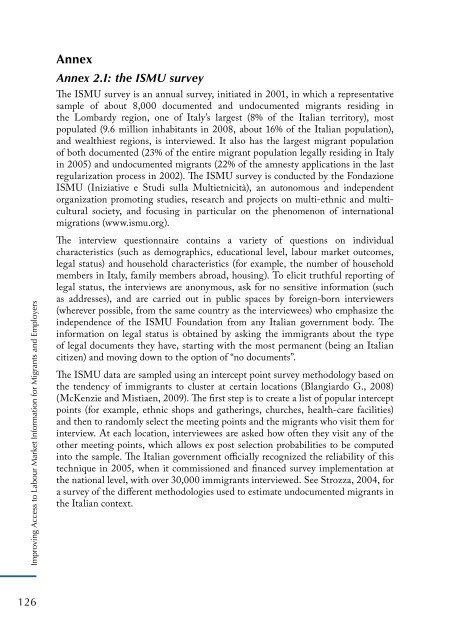International Organization for Migration (IOM)
International Organization for Migration (IOM)
International Organization for Migration (IOM)
Create successful ePaper yourself
Turn your PDF publications into a flip-book with our unique Google optimized e-Paper software.
Improving Access to Labour market In<strong>for</strong>mation <strong>for</strong> migrants and employers<br />
126<br />
Annex<br />
Annex 2.I: the ISMU survey<br />
The ISMU survey is an annual survey, initiated in 2001, in which a representative<br />
sample of about 8,000 documented and undocumented migrants residing in<br />
the Lombardy region, one of Italy’s largest (8% of the Italian territory), most<br />
populated (9.6 million inhabitants in 2008, about 16% of the Italian population),<br />
and wealthiest regions, is interviewed. It also has the largest migrant population<br />
of both documented (23% of the entire migrant population legally residing in Italy<br />
in 2005) and undocumented migrants (22% of the amnesty applications in the last<br />
regularization process in 2002). The ISMU survey is conducted by the Fondazione<br />
ISMU (Iniziative e Studi sulla Multietnicità), an autonomous and independent<br />
organization promoting studies, research and projects on multi-ethnic and multicultural<br />
society, and focusing in particular on the phenomenon of international<br />
migrations (www.ismu.org).<br />
The interview questionnaire contains a variety of questions on individual<br />
characteristics (such as demographics, educational level, labour market outcomes,<br />
legal status) and household characteristics (<strong>for</strong> example, the number of household<br />
members in Italy, family members abroad, housing). To elicit truthful reporting of<br />
legal status, the interviews are anonymous, ask <strong>for</strong> no sensitive in<strong>for</strong>mation (such<br />
as addresses), and are carried out in public spaces by <strong>for</strong>eign-born interviewers<br />
(wherever possible, from the same country as the interviewees) who emphasize the<br />
independence of the ISMU Foundation from any Italian government body. The<br />
in<strong>for</strong>mation on legal status is obtained by asking the immigrants about the type<br />
of legal documents they have, starting with the most permanent (being an Italian<br />
citizen) and moving down to the option of “no documents”.<br />
The ISMU data are sampled using an intercept point survey methodology based on<br />
the tendency of immigrants to cluster at certain locations (Blangiardo G., 2008)<br />
(McKenzie and Mistiaen, 2009). The first step is to create a list of popular intercept<br />
points (<strong>for</strong> example, ethnic shops and gatherings, churches, health-care facilities)<br />
and then to randomly select the meeting points and the migrants who visit them <strong>for</strong><br />
interview. At each location, interviewees are asked how often they visit any of the<br />
other meeting points, which allows ex post selection probabilities to be computed<br />
into the sample. The Italian government officially recognized the reliability of this<br />
technique in 2005, when it commissioned and financed survey implementation at<br />
the national level, with over 30,000 immigrants interviewed. See Strozza, 2004, <strong>for</strong><br />
a survey of the different methodologies used to estimate undocumented migrants in<br />
the Italian context.


